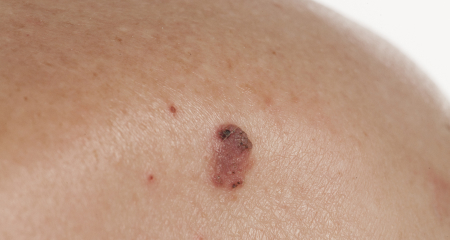
Melanoma is the most serious type of skin cancer. While it is the least common, it is also the most dangerous. Melanoma can rapidly spread to lymph nodes and internal organs, which can be life-threatening. Thankfully, Melanoma is highly treatable when detected in its early stages. If you notice a new or changing spot, it’s essential to contact your specialist at Northstar Dermatology.
Melanoma develops from abnormal mutations of the skin’s melanocytes (pigment-producing cells). Anyone of any skin type can develop Melanoma, but certain factors can increase your chance of developing this serious form of skin cancer.
Chances of developing Melanoma may increase from:
• History of prolonged sun exposure or indoor tanning
• History of blistering sunburns
• Having fair skin, light-colored eyes, or naturally red or blonde hair
• Having a large number of moles
• A family history of Melanoma
Melanoma is the most dangerous type of skin cancer. However, it is highly treatable when caught early. Regular skin exams with a board-certified dermatologist are essential for identifying potential signs of melanoma. Additionally, self-exams can help you monitor for warning signs.
Look for the following features in your moles:
• Asymmetry: one half does not match the other
• Border: uneven, blurred, or scalloped edges
• Color: multiple shades within a single mole
• Diameter: noticeable increase in size
• Evolution: changes in size, shape, or color, or looking different from other spots
If any of your moles show these characteristics, it’s important to schedule a Skin Cancer Screening with a specialist at Northstar Dermatology.
At Northstar Dermatology, our physicians specialize in the surgical treatment of melanoma. The most common approach is surgical excision, where the dermatologist removes both the cancerous tissue and a margin of surrounding tissue to ensure full clearance. The area is then closed with sutures, and some recovery time is necessary, including avoiding lifting and limiting physical activity for a few weeks.
In some cases, treatment may involve a referral to a Mohs surgeon. If the melanoma has reached an advanced stage, your dermatologist may recommend consultation with an oncologist.
If diagnosed with melanoma, prompt follow-up with your dermatologist is crucial, as melanoma can progress rapidly. Your board-certified dermatologist will work with you to determine the most effective treatment approach.
